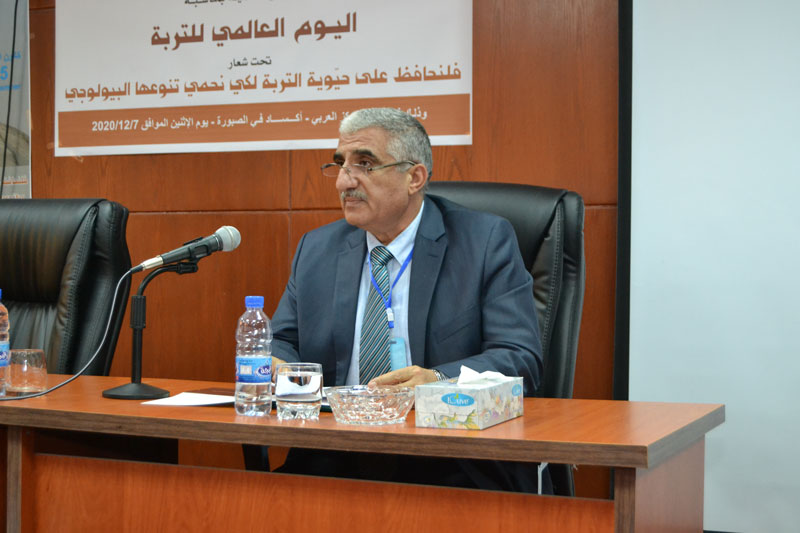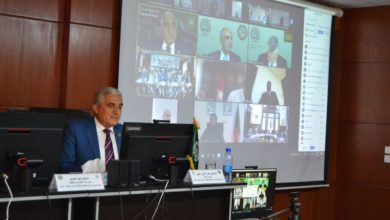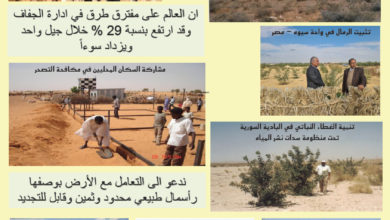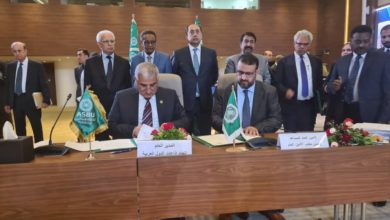ACSAD organization celebrates the World Soil Day
The Arab Center for the Studies of Arid Zones and Drylands (ACSAD) held at headquarter in Damascus a scientific symposium entitled” protecting the soil is everyone’s responsibility.” in celebration of the World Soil Day, which is organized this year under the campaign of “keep the soil alive, protect soil biodiversity. “
Dr. Nasr Edin Obaid, Director-General of the Arab Center (ACSAD), said in a speech at the opening ceremony of the symposium, which was held in cooperation with the General Commission for Scientific Agricultural Research in the Syrian Arab Republic, in the presence of its Director-General, Dr. Majida Mufleh, with the participation of Syrian institutions and stakeholders, and gathering a large number of Syrian and Arab experts and researchers. :” Climate changes and drought cycles had negative effects on soil and land resources, manifested in land degradation and desertification, decreasing arable lands, accelerating of soil erosion under the influence of erosion processes, decreasing yield of pastoral land, and slowing down soil formation processes.”
He added, To reduce land degradation and soil loss, ACASD had established a program to study and assess desertification cases, working to neutralize the effects of land degradation and to restore degraded lands, implementing pilot projects in this field, contribute to training, capacity-building, and technology transfer, follow up international activities, including World soil Day, and international environmental conventions of biodiversity and to combat desertification.
He pointed out that the ACSAD had established appropriate laboratories for analyzing soil samples and identify its specification, and had adopted remote sensing and GIS technologies for preparing soil maps to monitor it in order to solve problems, improving its specifications, and had implemented numerous soil survey and land classification projects, combating desertification and rehabilitating degraded lands, and Improve soil fertility and target its investment.
The Director-General explained that the projects implemented by ACSAD to reduce land degradation, address climate change and drought had positive impacts on the environment and human beings, of which the most important were soil stabilization (air and water) erosion stop, environmental rebalancing, and positive development of vegetation cover, improvement of physical and chemical soil properties, and reduction of dust storms. Helping to form organic material, regrowth bacterial and fungal life, increase soil fertility, preserve the genetic diversity of plant and animal groups within the new ecosystem, provide a pollutant-free environment, and find a balanced development through the development of the performance of available natural resources.
The Director-general of the Arab Center organization ACSAD, Dr. Nasr Edin Obaid, confirmed that ACSAD developed its strategy in dealing with soil and land resources, of which the most important components are, approving integrated approach in sustainable management and soil resources and protect it, developing the regional cooperation in the field of land degradation monitoring and early warning of desertification processes, adapting to climate change and mitigate the effects of drought, improving applied scientific research capabilities in soil, water, and vegetation fields, strengthen partnership with institutions concerned with soil and other natural resource issues, and increase consultation and coordination with Arab, regional and international organizations on investment of natural resource and rural development, and develop the agricultural extension; activating the participatory approach with local populations to achieve the best results and sustainable development of soil resources.
The activities of the scientific symposium included several axes, the most important of which is the role of ACSAD in maintaining soil health and productivity, the achievements of the Syrian National Team of the World soil Partnership 19 – 2020, the use of zeolite and sewage to improve the properties of sand soils, protect it from deterioration, and improve soil with organic solutions, soil resources and the role of international Rio conventions in its sustainability.




